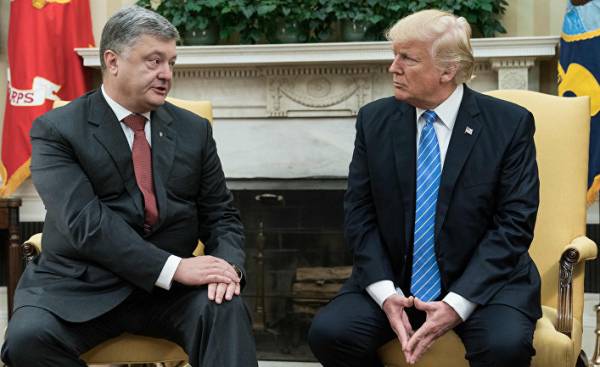
Currently, the administration trump makes the decision on the possible supply of lethal weapons to Ukraine. This potential move is designed to give the Ukrainian military the opportunity to get the Russians and their agents involved in a separatist uprising in the Eastern region of Donbas, to pay the bills and thereby to convince the Kremlin to lay down their arms.
Meanwhile, most likely, we should expect the opposite result of escalation of the conflict, which will lead to further loss of Ukrainian territory and jeopardize political stability in the country. Russia has unquestionable military superiority over Ukraine. The United States should not be encouraged Ukraine to the escalation of the conflict with Russia. Washington understands that Ukraine can not win.
Desire at all costs to provide Ukraine with lethal weapons — most likely in the form of anti-tank weapons — is understandable. 2014 Russian occupied and illegally annexed the Crimea and supported separatist rebellion in the Donbass, which killed more than ten thousand people. Moreover, Russia has participated in these acts of aggression to thwart the attempts of Ukraine to leave the sphere of influence of Moscow and to join the community of Western democracies.
In these circumstances, the United States must just as before to help the Ukrainians to defend themselves, assisting them in carrying out military reforms and the training of troops. So why not take the next step and not to give Ukraine lethal weapons?
First, to believe that Russian President Vladimir Putin will concede to the Donbass, even if some Russian will come home with a load of 200, that means you did not understand the nature of the Kremlin. Putin is a master of manipulating the Russian public, especially when talking about the Ukrainian conflict, and are unlikely to give up in that case, if the victim of the Russian side will continue to grow.
And he, most likely, will be to increase its military presence, while accusing the United States and Ukraine in the intensification of combat actions, and take steps to counteract the strengthening of the military potential of his enemy. Until now, Russians effectively confronted the military successes of Ukraine — in some cases responding to destructive actions. When in the summer of 2014 the Ukrainian troops moved to the Donbass and occupied the strategic city of Ilovaysk, Putin immediately called their own elite troops, which in an instant destroyed the city seized the Ukrainian division.
If Putin decides to escalate in response to the America providing lethal weapons to Ukraine, in the quiver of Washington will not have a lot of arrows. Whatever action taken the administration of the tramp, Russia will always be a step ahead. The Russian-Ukrainian border with a total length of 1,500 miles by land and sea, explains why the Kremlin has far more than Washington cares about the fate of Ukraine. Russia consciously takes the risk, as interested in the outcome of the game.
Instead of having to play along with what Russia is particularly strong — its military superiority over Ukraine — the United States must play on its main weakness and economic instability. On this front, a clear advantage of the US and its European allies, and not the Kremlin. Loss of income due to low fossil fuel prices and international sanctions imposed in response to Russia’s aggression in Ukraine has seriously affected the Russian economy. The continuation of the sanctions and, if necessary, their extension is the best mechanism of influence on Russia that the West wants to push for a diplomatic solution. It seems that the Congress understands this, recently demanded from the legislators for the White house tightening of American sanctions against Russia.
Sending lethal weapons to Ukraine has another negative aspect: it can provoke the rupture between the United States and its main European allies. Germany and France took over the main burden of diplomatic efforts to find a solution for Donbass, and both have long opposed sending lethal weapons to Ukraine to avoid escalation of the conflict.
Since the beginning of the conflict the US and Europe to coordinate their actions, to work together to provide non-lethal military assistance to Ukraine, as well as to prepare economic sanctions against Russia.
Transatlantic solidarity is perhaps the greatest strength of the West that a United front is opposed to Putin and Russia holds in the penalty box. Despite the pressure exerted on him by both sides of the Atlantic of the party calling for the abolition of sanctions and the use of commercial benefits.
A recent law of Congress on sanctions, which introduces measures that were not coordinated with the European Union and can cause excessive damage to European companies, became for Europeans the last straw. If Washington decides to continue to act at their own discretion and to send to Ukraine lethal weapons, solidarity on the Ukrainian question is in danger of permanently disappearing.
Putin is making every possible effort to achieve this goal. Washington will make a serious strategic error if we trigger a transatlantic rift, which is so long been waiting for Moscow.
The conflict in Ukraine, apparently, and will poison relations with the West, Russia until, until you reach a diplomatic solution. But sending lethal weapons to Ukraine is a direct path to military escalation and the transatlantic discord. The best way to bring peace to Ukraine is to maintain TRANS-Atlantic unity, aimed at preserving the political and economic isolation of Russia up until a compromise is reached at the negotiating table.
Charles Kupchan — Professor of international relations at Georgetown University and senior fellow at the Council on foreign relations between 2014 and 2017, he served in the national security Council.






